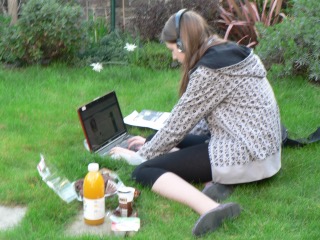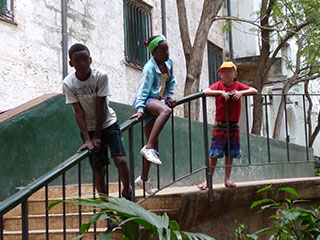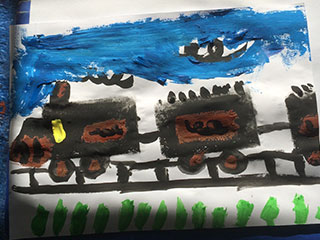
Child psychotherapy – information for parents
Are you a parent who is:
- feeling tense
- exhausted over attempts to negotiate with your teen?
- running out of goodwill/losing patience
- withdrawing as your offspring goes through major changes?
- struggling on your own (or in partnership) to put down clear limits and boundaries to help your teenager?
- in a stepfamily situation where getting needs met in relationship is proving challenging for all?
Perhaps therapy for your child could help?
Therapy:
- helps children and adolescents feel stronger inside, with a clearer sense of self
- fosters age-appropriate understanding of troublesome thoughts and feelings
- facilitates young people’s ability to communicate, leading to better relationships
- develops skills for healthy, safe expression of everyday emotions
Children and adolescents encounter so many physical and psychological challenges as they develop and grow. At times they may also encounter periods of ‘stuckness’ or experience difficulties in making or sustaining relationships, or managing a particular aspect of their lives. A child who risks being labelled as a ‘problem’ at school or among peers may be caught in a destructive cycle of negative behaviour. Therapeutic help can offer an opportunity to break this pattern and replace it with more positive alternatives. A good experience of therapy helps young people recover their ‘spark’ and find their confidence, enabling them to catch up and get back on the ‘growth escalator’.
Who can benefit from therapy?
 Therapy may be useful for young people aged 6–21 and older who have experienced any of the following:
Therapy may be useful for young people aged 6–21 and older who have experienced any of the following:
- anxiety/panics
- attention difficulties, ADHD
- abuse or neglect
- bed wetting/encopresis
- behavioural difficulties
- bereavement
- bullying or cyber bullying
- difficulty making friends
- disability-related difficulties, developmental delay
- exam worries/performance anxiety
- family changes (eg adoption, divorce, fostering, stepfamily situations)
- fear of needles
- health worries
- identity issues
- loss or separation
- peer pressure
- perfectionism
- sad feelings
- school-related difficulties
- shyness and under-confidence
- sleeping problems
- social anxiety
- transgenerational trauma
- transcultural difficulties
- worries about the future
How I work
As a child psychotherapist I take particular care to establish a safe environment within which the child or teenager will feel welcomed. I want to offer an accepting and trusting relationship so that s/he can relax and begin to talk about whatever is of concern, in their own way and at their own pace. The quality of this developing relationship between us is essential for growth and for a successful outcome.
 As a therapist I am interested in the whole person: body, mind and spirit. This means that in child psychotherapy I take a holistic approach to health, aiming to encourage a flexible balance between body, feeling, intellect and imagination. Distressed children and young people often cut off or restrict part of these vital functions; in so doing they lose connection with a key part of their unique Self. Remedying this becomes an important aspect of therapy, helping to restore wholeness and wellbeing.
As a therapist I am interested in the whole person: body, mind and spirit. This means that in child psychotherapy I take a holistic approach to health, aiming to encourage a flexible balance between body, feeling, intellect and imagination. Distressed children and young people often cut off or restrict part of these vital functions; in so doing they lose connection with a key part of their unique Self. Remedying this becomes an important aspect of therapy, helping to restore wholeness and wellbeing.
In therapy with children and young people I use a range of sensory and arts-based experiences that help restore balance and aid communication. I carefully tailor activities likely to help your child explore troublesome thoughts and feelings in our dialogue. This approach helps children let go of deeply buried worries and feel stronger inside. My intention is to help your child express him or herself clearly, to own personal needs and wants and manage frustration, in relational ways. This helps children and adolescents develop the flexibility and adaptability needed to cope with life’s challenges.
Our work together may include acting, drawing, working with clay, music-making, puppetry, rapping, making sand tray scenes, creating haiku or story making. Some teenagers prefer ‘the talking cure’ to arts-based therapies; others like to ‘mix it up’, making use of both approaches.
Why an arts-based approach?
 As infants we communicate with our bodies using gesture, movement and sound -long before we acquire language. Many of our emotional and sensory experiences are hard to translate verbally: sometimes words just can’t do justice to our expression. The arts however are more ‘experience near’ for children and adolescents and are often linked with play and playfulness.
As infants we communicate with our bodies using gesture, movement and sound -long before we acquire language. Many of our emotional and sensory experiences are hard to translate verbally: sometimes words just can’t do justice to our expression. The arts however are more ‘experience near’ for children and adolescents and are often linked with play and playfulness.
Getting started
Initially, wherever possible I meet the young person together with parents and any other family members living at home. Meeting together in this way models transparency (‘no secrets’), which helps build trust. It helps us all get acquainted and enables me to learn something from you about the difficulties encountered, what has been tried and what solutions are being sought. In particularly complex situations I may suggest a second consultation to gain a fuller picture of what is happening to advise you better regarding the next step.
Following assessment I can usually advise on recommended therapy options. These might involve individual, group or family-based meetings or referral on to another agency.
Therapy may be brief, comprising a short series of weekly sessions. With more complex or longstanding difficulties, meeting for a longer period of time is generally advisable. In all cases progress is reviewed together on a regular basis.
Consultations with parents
Whilst parenting is one of life’s most rewarding activities it can also at times be one of life’s most challenging ones. Parenting may come easily to you or leave you feeling flustered and bewildered. It can also bring up feelings of guilt and trigger painful memories from your own childhood. It is therefore essential to understand how you yourself experienced being parented.
 Our parents provide us with our first experience of what parenting entails and how it is carried out. However, that doesn’t mean you are obliged to raise your children in the same way. I can help you explore your feelings about how you were parented, identify what you value from your own experience of growing up, and learn how to let go of what you don’t value. Your relationships with your spouse/partner, other family members and friends are also likely to influence the way you approach being a parent.
Our parents provide us with our first experience of what parenting entails and how it is carried out. However, that doesn’t mean you are obliged to raise your children in the same way. I can help you explore your feelings about how you were parented, identify what you value from your own experience of growing up, and learn how to let go of what you don’t value. Your relationships with your spouse/partner, other family members and friends are also likely to influence the way you approach being a parent.
Whether you are struggling with one specific issue, or with raising children in general, I can provide counselling specifically for parents and/or stepparents. I will work with you to develop a set of reliable skills, which will enable you to feel more confident and prepared. My aim is to equip you to approach parenting in loving, mindful and relational ways.
We may address areas such as:
- discipline and limit setting
- raising confident and capable children
- balancing work and home life
- communicating and connecting with your child
- coping with tears and tantrums
- organising quality time and your support system
- managing transitions/major life changes
- finding support
If your child is in therapy with me I may recommend you have some separate adult- oriented sessions to discuss marital, loss or other issues, either with myself or with a colleague. You are in any case welcome to seek my assistance in exploring issues relating to young people even if your child is not in therapy.
Helping your child
Parents play a vital part in supporting the therapeutic process and are invited to attend the initial meeting and regular progress reviews. When a young person needs to experiment with finding new ways of belonging or behaving at home I may encourage them to negotiate with parents, where appropriate, regarding introducing changes, to encourage a successful outcome. I sometimes teach parents child management skills which they can then apply themselves at home (see below).
About parenting adolescents
Coping with adolescent changes can be turbulent at times and not just for the young person concerned. As a parent, finding ways of ‘steering a course’ that is clear yet fair can be taxing for the best of us. Especially if you don’t have much support.

Opportunities for painting and drawing in children’s therapy provide ‘experience-near’ ways of safely communicating hopes, fears, nightmares, muddles etc…
We live in a world that is changing fast and our own experience of being an adolescent may be far from the kind of world that today’s teens have to navigate, with different expectations and the mixed blessings posed by our living in an age of instant electronic communications and social media.
As a parent myself whose professional background lies in counselling children and families I have worked in various mental health and social care settings. I have experience of supporting other parents over a host of issues and would be happy to work alongside you in helping to restore balance at home. Or to think with you about ways to fine-tune your limit setting/management with regard to your teenage children.
Not all adolescents want to see a therapist 1:1. Some however prefer to come and meet me with their family so that they feel less exposed or focussed on. That’s always an option.
And if your teenage son or daughter prefers not to see me at this point, you may instead decide to book in a session or sessions with me to help think about how to improve matters. This comes with a ‘health warning’, however: just as I don’t ‘fix’ kids, similarly I don’t have magic solutions for families either.
I am, though, willing to put time aside to think seriously with you about what has been tried before and what else might be more effectively utilised, in order to try and bring about a successful outcome. I have been doing this kind of work for over 20 years with some success – though a certain amount inevitably will also depend on you and your commitment to change.
The supportive work I offer parents is usually carried out face to face at my West London practice, at least initially, though I can sometimes offer telephone sessions if required later on.
Did you know that adolescence is a time of constant change?
During adolescence a vast number of developmental changes are going on simultaneously within the body and the brain. For many young people these changes may also affect their relationships with family, friends and their connection with wider culture or community.
 While adolescence per se is a growthful, normal part of the developing life cycle it can often be confusing and scary, throwing up many questions for the young person. These may include concerns about finding one’s identity, approval, career, love, values and survival.
While adolescence per se is a growthful, normal part of the developing life cycle it can often be confusing and scary, throwing up many questions for the young person. These may include concerns about finding one’s identity, approval, career, love, values and survival.
These important quests to find out who one is and how to make an effective transition into adulthood can sometimes feel hard to deal with alone. A trusting therapy relationship may help teens manage this challenging transitional phase, providing them with a guideline and a safe ‘hosted space’. Therapy often becomes a place to discuss, explore and evaluate different ways of being and belonging without judgement. As therapist my role is to give constructive feedback, providing a mixture of support and gentle challenge.
Maturation
Development does not automatically end at age 18, indeed for many the process of adolescence continues well into young adulthood. Adolescents and young adults who enter therapy often put to use a mixture of arts-based work together with ‘talking therapies’ to explore their concerns.
